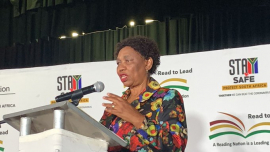
Basic Education Minister Angie Motshekga has called on men and women to never cease to fight for a non-sexist society with a deep respect for its women and girl children.
“If we fail, the struggle for women’s total emancipation will regress to the detriment of the national cause to free the potential of each one of us,” Motshekga said.
Motshekga made the call when she was delivering a memorial lecture on the life and times of Mama Charlotte Maxeke held at The Glen High School in Pretoria.
The lecture was presented in the context of the United Nations inspired International Day of the Girl Child commemorated last week.
Government has declared 2021 the Year of Charlotte Maxeke, and is being commemorated under the theme, ‘The Year of Charlotte Maxeke: In celebration of the 150th birthday anniversary of Mme Charlotte Mannya Maxeke’.
Motshekga said the best way to honour the struggle stalwart is to free the potential of each girl child, each woman and liberate men from their unearned vantage point of male privilege.
“If we did not aim to smash the engrained system of patriarchy, male chauvinism and win the war against gender-based violence and femicide (GBVF), Mama Charlotte Maxeke’s fervent contribution to the national cause of national liberation would have been in vain,” Motshekga said.
To keep Maxeke’s memory alive and continue the fight for the liberation of the girl child, Motshekga said the department has registered some notable successes, however, the work is not complete.
“I still call upon more collaboration and scaling of some of our excellent policy-driven initiatives. We will not tire until our mission of gender empowerment for the girl child is achieved.
“Our operational framework on Care and Support for Teaching and Learning places the child at the centre, with a deliberate bias towards vulnerable girl children,” Motshekga said.
Liberating children
The Minister highlighted government’s initiatives and policy positions, through the Department of Basic Education, that seek to liberate children, honour women and smash the system of patriarchy.
These include, among others, the Adolescent Girls and Young Women (AGYW) formation, which focuses on providing Comprehensive Sexuality Education (CSE), linkages to health and social services, homework assistance, and career guidance.
The programmes are implemented in 14 districts with high HIV prevalence.
The Minister said over 500 000 learners have received Comprehensive Sexuality Education.
“We have placed over 4 000 Learner Support Agents (LSAs) in schools to scale up sexuality education and act as partners to link learners to services. The Adolescent Girls and Young Women coverage will extend to 60% of education districts by 2022.
“In 2019, we developed standard operating procedures for the provision of sexual reproductive health services in secondary schools. The SOPs are aligned to the Integrated School Health Policy, which provides guidance on on-site services at schools,” Motshekga said.
Learner pregnancy
The DBE has also developed the Policy on the Prevention and Management of Learner Pregnancy in Schools, which aims to support the rights of learners to education, in case they fall pregnant.
The policy guides schools on supporting and managing pregnancy cases to eliminate discrimination and exclusion of pregnant learners from their studies.
Motshekga reported that Cabinet has adopted the revised Basic Education Policy on the Prevention and Management of Learner Pregnancy in Schools as a “pushback against men in fancy suits who impregnate girls as young as 10 years”.
“This revised policy seeks to ensure the accessible provision of information on pregnancy prevention, care for the pregnant, counselling and choice of termination of pregnancy, amongst others. Furthermore, it provides for the upscaling of the Comprehensive Sexuality Education as a crucial part of school curricula to safeguard learners’ sexual and reproductive health rights.
National Strategic Plan on GBVF
In 2020, President Cyril Ramaphosa launched the National Strategic Plan on Gender-based Violence and Femicide.
Motshekga said the department already had in place various policies to address the safety of girl learners.
These include the Protocol for the Management and Reporting of Sexual Abuse and Harassment in Schools, the National School Safety Framework, and the Protocol to Deal with Incidences of Corporal Punishment in Schools.
“The strategic plan on GBV came when the country experienced a sudden spike in GBV cases in the earlier parts of the hard COVID-19 lockdown. We bemoaned the rise in GBV cases, and our girl children were caught in the quagmire; it reinforced our contention that girls are safer in schools than at home.
“Currently, we are finalising the Guidelines for the social inclusion of the LGBTQ+ schooling community. This initiative is a collective effort with civil society organisations so that all children, irrespective of gender identity and sexual orientation, can realise their constitutional right to education,” the Minister said. – SAnews.gov.za


